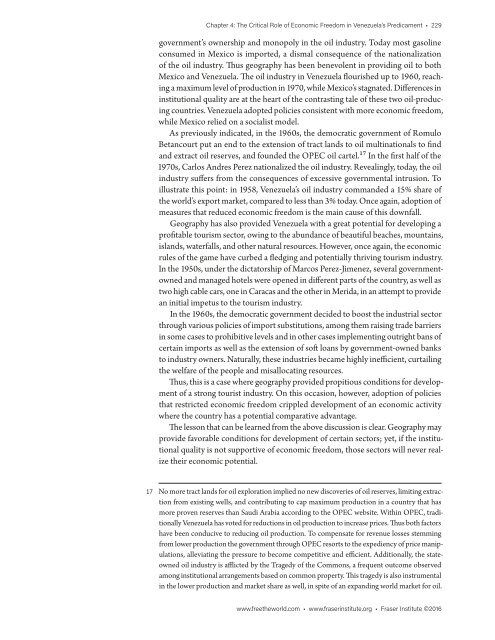Economic Freedom of the World
economic-freedom-of-the-world-2016
economic-freedom-of-the-world-2016
Create successful ePaper yourself
Turn your PDF publications into a flip-book with our unique Google optimized e-Paper software.
Chapter 4: The Critical Role <strong>of</strong> <strong>Economic</strong> <strong>Freedom</strong> in Venezuela’s Predicament • 229<br />
government’s ownership and monopoly in <strong>the</strong> oil industry. Today most gasoline<br />
consumed in Mexico is imported, a dismal consequence <strong>of</strong> <strong>the</strong> nationalization<br />
<strong>of</strong> <strong>the</strong> oil industry. Thus geography has been benevolent in providing oil to both<br />
Mexico and Venezuela. The oil industry in Venezuela flourished up to 1960, reaching<br />
a maximum level <strong>of</strong> production in 1970, while Mexico’s stagnated. Differences in<br />
institutional quality are at <strong>the</strong> heart <strong>of</strong> <strong>the</strong> contrasting tale <strong>of</strong> <strong>the</strong>se two oil-producing<br />
countries. Venezuela adopted policies consistent with more economic freedom,<br />
while Mexico relied on a socialist model.<br />
As previously indicated, in <strong>the</strong> 1960s, <strong>the</strong> democratic government <strong>of</strong> Romulo<br />
Betancourt put an end to <strong>the</strong> extension <strong>of</strong> tract lands to oil multinationals to find<br />
and extract oil reserves, and founded <strong>the</strong> OPEC oil cartel.17 In <strong>the</strong> first half <strong>of</strong> <strong>the</strong><br />
1970s, Carlos Andres Perez nationalized <strong>the</strong> oil industry. Revealingly, today, <strong>the</strong> oil<br />
industry suffers from <strong>the</strong> consequences <strong>of</strong> excessive governmental intrusion. To<br />
illustrate this point: in 1958, Venezuela’s oil industry commanded a 15% share <strong>of</strong><br />
<strong>the</strong> world’s export market, compared to less than 3% today. Once again, adoption <strong>of</strong><br />
measures that reduced economic freedom is <strong>the</strong> main cause <strong>of</strong> this downfall.<br />
Geography has also provided Venezuela with a great potential for developing a<br />
pr<strong>of</strong>itable tourism sector, owing to <strong>the</strong> abundance <strong>of</strong> beautiful beaches, mountains,<br />
islands, waterfalls, and o<strong>the</strong>r natural resources. However, once again, <strong>the</strong> economic<br />
rules <strong>of</strong> <strong>the</strong> game have curbed a fledging and potentially thriving tourism industry.<br />
In <strong>the</strong> 1950s, under <strong>the</strong> dictatorship <strong>of</strong> Marcos Perez-Jimenez, several governmentowned<br />
and managed hotels were opened in different parts <strong>of</strong> <strong>the</strong> country, as well as<br />
two high cable cars, one in Caracas and <strong>the</strong> o<strong>the</strong>r in Merida, in an attempt to provide<br />
an initial impetus to <strong>the</strong> tourism industry.<br />
In <strong>the</strong> 1960s, <strong>the</strong> democratic government decided to boost <strong>the</strong> industrial sector<br />
through various policies <strong>of</strong> import substitutions, among <strong>the</strong>m raising trade barriers<br />
in some cases to prohibitive levels and in o<strong>the</strong>r cases implementing outright bans <strong>of</strong><br />
certain imports as well as <strong>the</strong> extension <strong>of</strong> s<strong>of</strong>t loans by government-owned banks<br />
to industry owners. Naturally, <strong>the</strong>se industries became highly inefficient, curtailing<br />
<strong>the</strong> welfare <strong>of</strong> <strong>the</strong> people and misallocating resources.<br />
Thus, this is a case where geography provided propitious conditions for development<br />
<strong>of</strong> a strong tourist industry. On this occasion, however, adoption <strong>of</strong> policies<br />
that restricted economic freedom crippled development <strong>of</strong> an economic activity<br />
where <strong>the</strong> country has a potential comparative advantage.<br />
The lesson that can be learned from <strong>the</strong> above discussion is clear. Geography may<br />
provide favorable conditions for development <strong>of</strong> certain sectors; yet, if <strong>the</strong> institutional<br />
quality is not supportive <strong>of</strong> economic freedom, those sectors will never realize<br />
<strong>the</strong>ir economic potential.<br />
17 No more tract lands for oil exploration implied no new discoveries <strong>of</strong> oil reserves, limiting extraction<br />
from existing wells, and contributing to cap maximum production in a country that has<br />
more proven reserves than Saudi Arabia according to <strong>the</strong> OPEC website. Within OPEC, traditionally<br />
Venezuela has voted for reductions in oil production to increase prices. Thus both factors<br />
have been conducive to reducing oil production. To compensate for revenue losses stemming<br />
from lower production <strong>the</strong> government through OPEC resorts to <strong>the</strong> expediency <strong>of</strong> price manipulations,<br />
alleviating <strong>the</strong> pressure to become competitive and efficient. Additionally, <strong>the</strong> stateowned<br />
oil industry is afflicted by <strong>the</strong> Tragedy <strong>of</strong> <strong>the</strong> Commons, a frequent outcome observed<br />
among institutional arrangements based on common property. This tragedy is also instrumental<br />
in <strong>the</strong> lower production and market share as well, in spite <strong>of</strong> an expanding world market for oil.<br />
www.free<strong>the</strong>world.com • www.fraserinstitute.org • Fraser Institute ©2016


